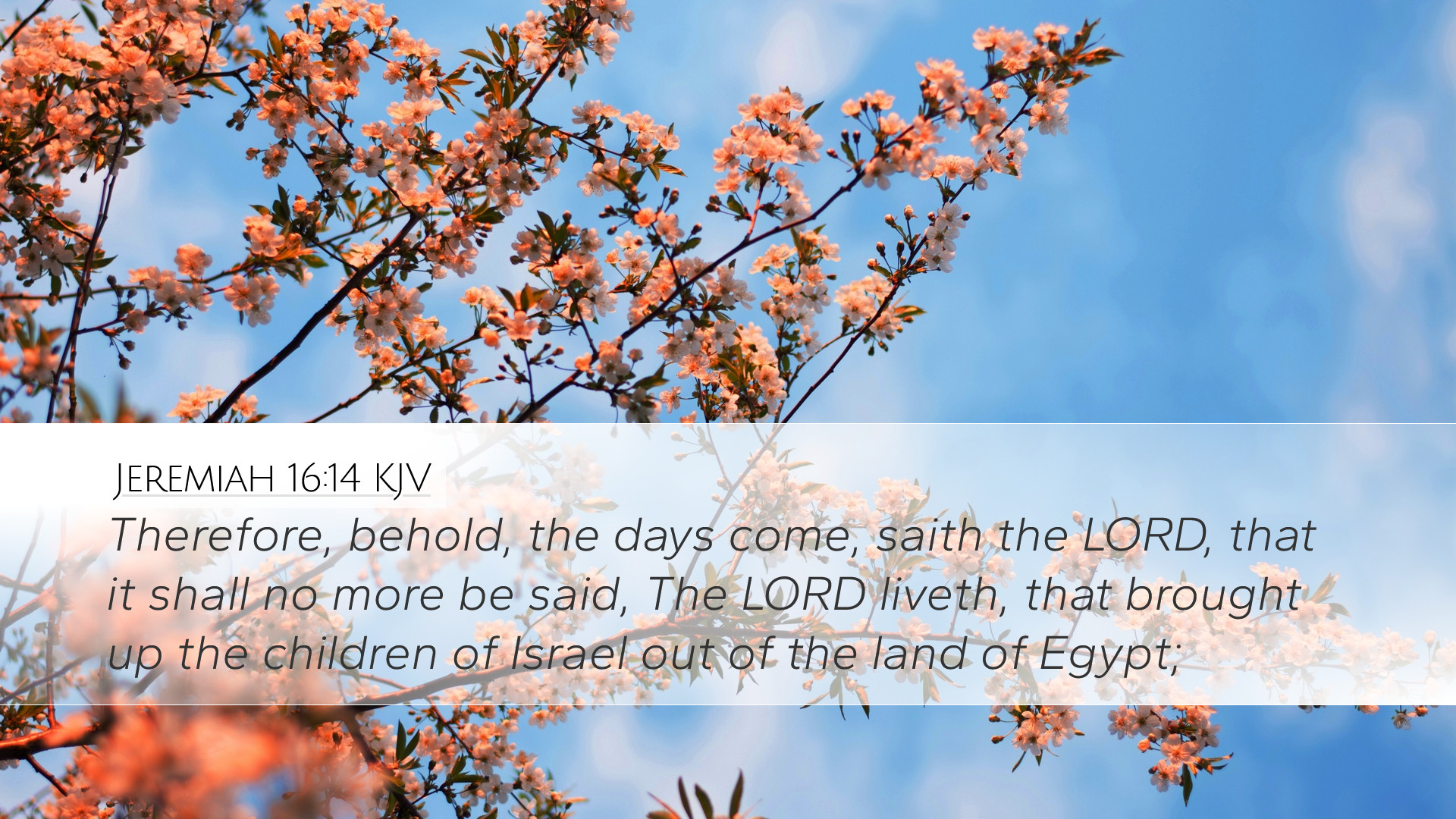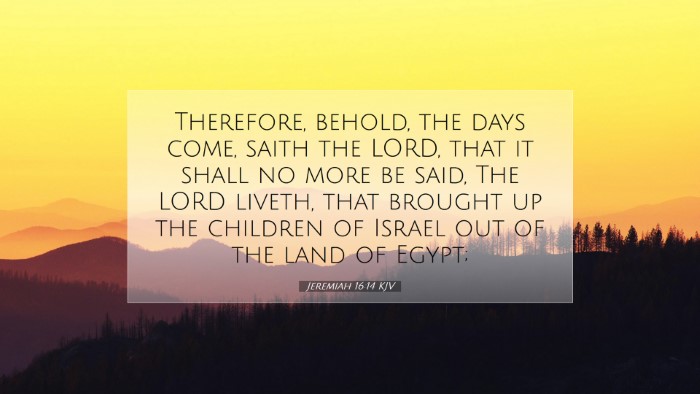Commentary on Jeremiah 16:14
Verse: "Therefore, behold, the days come, saith the LORD, that it shall no more be said, The LORD liveth, that brought up the children of Israel out of the land of Egypt."
Introduction
This significant verse from the prophet Jeremiah serves as a pivotal moment in prophetic literature, conveying the transition from a historical understanding of God's salvation to an expansion of that understanding based on future deliverance. In this commentary, we delve into insights drawn from various public domain commentaries, emphasizing the theological implications and historical context relevant to pastors, students, theologians, and Bible scholars.
Theological Implications
Jeremiah's declaration of a future time marks a transformative shift in how God's actions will be remembered among the people of Israel. The phrase "the days come" introduces a new era that God is preparing to initiate.
- Divine Foreknowledge: This foretold era emphasizes God's omniscience and His sovereign control over history. Albert Barnes highlights that the promise of a new exodus showcases God's ability to intervene in unprecedented ways, suggesting that Israel's future experiences of divine deliverance will eclipse even the Exodus from Egypt.
- Memory and Identity: Adam Clarke points out that the Israelites' identity has long been tied to their escape from Egypt. However, this new declaration denotes an upcoming act of God that will redefine their understanding of liberation and divine care.
- Shift in Covenant Understanding: Matthew Henry notes that while the Exodus was an extraordinary event, the anticipated future deliverance hints at a more profound spiritual renewal that will shape Israel's future covenant relationship with God.
Historical Context
The historical backdrop during which Jeremiah prophesied was filled with turmoil and impending judgment. Israel had deviated from covenant fidelity, leading to impending disaster. This prophecy emerges amidst such a dire reality.
- Judgment and Hope: The previous chapters of Jeremiah recount the people's rebellion and the consequences of their actions. Yet, amidst condemnation, there exists the promise of restoration and hope. Barnes argues that the contrasted deliverance foreshadows God's unwavering commitment to His people, even in disappointment.
- Context of Exile: Clarke elaborates that this prophecy directly addresses those facing exile, reassuring them that God has not abandoned them. The anticipation of a new exodus serves to inspire hope among the captives in Babylon.
- Future Generational Remembrance: Henry expresses that the mention of no longer recalling the Exodus illustrates the depth of the future event's significance. This signifies future generations will acknowledge God's acts, beyond mere historical accounts.
Literary Structure
Jeremiah 16:14 utilizes literary devices such as contrast and repetition to underline its message. The stark shift from the past to a future promise heightens the emotional and spiritual weight of the prophecy. In this vein, the prophetic voice serves as both a warning and an encouragement, calling Israel to return to the Lord while also promising God’s restorative actions.
- Contrast Between Past and Future: The verse is positioned to draw a clear distinction between previous experiences of God's deliverance and what is yet to come. Highlighting the inadequacy of former understanding invites deeper reflection on God's evolving relationship with His people.
- Resonance in Prophetic Literature: The declaration reflects common themes found in prophetic writings — of moving from judgment to renewal. Such narrative arcs function as spiritual reminders of God’s character and enduring faithfulness.
Spiritual Application
This prophetic declaration invites spiritual leaders and believers today to re-evaluate their understanding of God’s work in their lives. There is a call for reflection on our own experiences of divine intervention and the ways in which we narrate our faith journey.
- Encouragement in Difficult Times: As pastors navigate challenging congregational realities, the promise found in Jeremiah serves as an assurance that God is at work even when circumstances seem dire.
- Renewal of Faith: The spiritual community is called to anticipate new movements of God. This encourages faithful expectation and reminds believers that the God who delivered in the past is the same God who is active today.
- Cultivating Hope: This verse teaches the value of maintaining hope amid chaos and uncertainty. Just as God’s people were reminded of His plans, contemporary believers are encouraged to embrace hope as a vital element of faith.
Conclusion
Jeremiah 16:14 is a profound proclamation that transcends historical confines. The transition from remembering former deliverances to anticipating future acts of God profoundly affects our understanding of divine faithfulness. The insights offered through various commentaries illuminate the necessity of recognizing and proclaiming God's ongoing work in the lives of His people. In doing so, they challenge contemporary believers to live in expectation of God's renewing grace and transformative power.


